302 scholarly books by University College London and 19
have author last names that start with S
302 scholarly books by University College London and 19
302 scholarly books by University College London
19 have author last names that start with S have author last names that start with S
19 have author last names that start with S have author last names that start with S
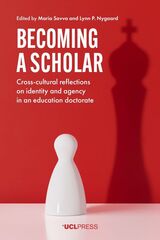
Becoming a Scholar
Cross-Cultural Reflections on Identity and Agency in an Education Doctorate
Maria Savva
University College London, 2021
A window into the lives of nine non-traditional doctoral students and their journeys to become scholars.
This book provides a window into the lives of nine non-traditional doctoral students. As mature, part-time, international students enrolled in a professional doctorate program, the students reflect on the transformation process of becoming scholars, as their narratives provide breadth and depth to themes that represent a diverse cross-section of cultures, identities, and communities. The volume brings the “human face” behind the doctoral journey to the forefront, as the narratives draw much-needed attention to the personal journey that inevitably parallels and intersects with the academic journey. Although the narratives are drawn from a professional doctor-in-education program based in the United Kingdom, the struggles will resonate with a much wider range of doctoral students and academics, sparking lively discussion, debate, and reflection. A must-read for students preparing to embark on the doctoral journey, this book will be essential reading for leaders of doctoral programs who wish to equip students with important knowledge about the challenges ahead.
This book provides a window into the lives of nine non-traditional doctoral students. As mature, part-time, international students enrolled in a professional doctorate program, the students reflect on the transformation process of becoming scholars, as their narratives provide breadth and depth to themes that represent a diverse cross-section of cultures, identities, and communities. The volume brings the “human face” behind the doctoral journey to the forefront, as the narratives draw much-needed attention to the personal journey that inevitably parallels and intersects with the academic journey. Although the narratives are drawn from a professional doctor-in-education program based in the United Kingdom, the struggles will resonate with a much wider range of doctoral students and academics, sparking lively discussion, debate, and reflection. A must-read for students preparing to embark on the doctoral journey, this book will be essential reading for leaders of doctoral programs who wish to equip students with important knowledge about the challenges ahead.
[more]
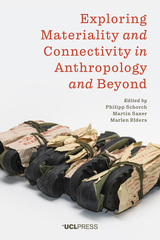
Exploring Materiality and Connectivity in Anthropology and Beyond
Philipp Schorch
University College London, 2020
Exploring Materiality and Connectivity in Anthropology and Beyond provides a new look at the old anthropological concern with materiality and connectivity. It understands materiality, not as defined property of some-thing, nor does it take connectivity as merely a relation between discrete entities. It sees materiality and connectivity as two interrelated modes in which an entity is, or more precisely – is becoming, in the world. Throughout the four-year research process that led to this book, the authors approached this question not just from a theoretical perspective; taking the suggestion of 'thinking through things' literally and methodologically seriously, the first two workshops were dedicated to practical, hands-on exercises working with things. From these workshops a series of installations emerged, straddling the boundaries of art and academia. Throughout the pages of this volume, the reader is invited to travel beyond imaginaries of a universe of separate planets united by connections, and to venture with us instead into the thicket of thing~ties in which we live.
[more]
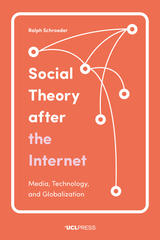
Social Theory After the Internet
Media, Technology, and Globalization
Ralph Schroeder
University College London, 2018
The internet has fundamentally transformed society in the past twenty-five years, yet existing theories of communication have not kept pace with the digital world. This book focuses on everyday effects of the internet—including information-seeking, big data, and the growing importance of smartphone use—to explain how the internet surpasses traditional media. Synthesizing global perspectives, Ralph Schroeder posits a theory on the internet’s role, and how both technological and social forces shape its significance.
[more]

Obstacles to Environmental Progress
A US Perspective
Peter C. Schulze
University College London, 2022
A comprehensive guide to the impediments facing environmentally progressive agendas.
Despite the comprehensively understood severity of environmental problems faced today, progress in the United States is continually stymied, making sustainability feel like a far-off goal. Obstacles to Environmental Progress takes up the structural, political, and cultural forces that routinely hinder progress on existing environmental issues. Addressing problems both small and large, often regardless of whether an issue is controversial, this book illustrates obstacles that manifest in the United States but are globally pertinent. Peter Schulze identifies eighteen practical obstacles that fall into three categories: scientific challenges to anticipating and detecting problems; political and economic factors that interfere with responding; and obstacles to effective responses. This book seeks to hasten environmental progress by bridging academic disciplines to forewarn and forearm those who might otherwise encounter these anti-environmentalist obstacles in an ad-hoc manner.
Despite the comprehensively understood severity of environmental problems faced today, progress in the United States is continually stymied, making sustainability feel like a far-off goal. Obstacles to Environmental Progress takes up the structural, political, and cultural forces that routinely hinder progress on existing environmental issues. Addressing problems both small and large, often regardless of whether an issue is controversial, this book illustrates obstacles that manifest in the United States but are globally pertinent. Peter Schulze identifies eighteen practical obstacles that fall into three categories: scientific challenges to anticipating and detecting problems; political and economic factors that interfere with responding; and obstacles to effective responses. This book seeks to hasten environmental progress by bridging academic disciplines to forewarn and forearm those who might otherwise encounter these anti-environmentalist obstacles in an ad-hoc manner.
[more]
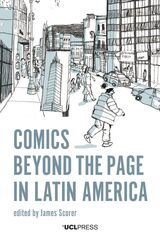
Comics Beyond the Page in Latin America
James Scorer
University College London, 2019
Comics Beyond the Page in Latin America is a cutting-edge study of the expanding worlds of Latin American comics. Despite lack of funding and institutional support, not since the mid-twentieth century have comics in the region been so dynamic, so diverse and so engaged with pressing social and cultural issues. Comics are being used as essential tools in debates about digital cultures, gender identities, and political disenfranchisement, as well as a whole range of other social issues. Rather than analyzing the current boom in comics by focusing just on the printed text, however, this book looks at diverse manifestations of comics 'beyond the page'. Contributors look at digital comics and social media networks; comics as graffiti and stencil art in public spaces; comics as a tool for teaching architecture or processing social trauma; and comics consumption and publishing as forms of shaping national, social, and political identities.
[more]
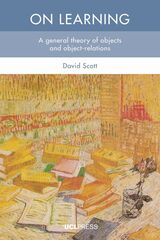
On Learning
A General Theory of Objects and Object-Relations
David Scott
University College London, 2021
A philosophical work that tackles the question, “What is learning?”.
What is learning? This book is a philosophical work that develops a general theory of ontological objects and object-relations, examining concepts as acquired dispositions. David Scott answers a series of questions about concepts in general and the concept of learning in particular. This volume offers a counterargument to empiricist conceptions of learning, rejecting the propagation of simple messages about learning, knowledge, curriculum, and assessment. Instead, Scott argues that values are central to understanding how we live, permeating our descriptions of the world, the attempts we make at creating better futures, and our relations with other people.
What is learning? This book is a philosophical work that develops a general theory of ontological objects and object-relations, examining concepts as acquired dispositions. David Scott answers a series of questions about concepts in general and the concept of learning in particular. This volume offers a counterargument to empiricist conceptions of learning, rejecting the propagation of simple messages about learning, knowledge, curriculum, and assessment. Instead, Scott argues that values are central to understanding how we live, permeating our descriptions of the world, the attempts we make at creating better futures, and our relations with other people.
[more]
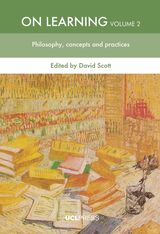
On Learning, Volume 2
Philosophies, Concepts and Practices
David Scott
University College London, 2024
An original and provocative interpretation of learning as a concept and as a practice.
The contributors to this volume focus on two meta-concepts: knowledge and learning, on the relationship between the two, and the way these can be framed in epistemic, social, political, and economic terms. Knowledge and learning, as meta-concepts, are positioned in various networks or constellations of meaning, principally: their antecedents, their relations to other relevant concepts, and the way the concepts are used in the lifeworld.
The various authors in this book explore several important concepts that are relevant to the idea of learning: Meta-concepts such as epistemology, inferential role semantics, phenomenology, rationality, thinking, hermeneutics, critical realism, and pragmatism. Meso-concepts such as probability, woman, training, assessment, education, system, race, friendship, Bildung, curriculum, ecology and pedagogy. Like David Scott’s first volume of On Learning, this collection also focuses on philosophy, concepts, and practices as a response to empiricist and positivist conceptions of knowledge. It challenges reductionist ideas of learning that have filtered through to the management of our schools, colleges, and universities; confronts over-simplified messages about learning, knowledge, curriculum, and assessment; and fosters the denial that values are central to understanding how we live and how we should live, the normative dimension to social policy and social theory.
The contributors to this volume focus on two meta-concepts: knowledge and learning, on the relationship between the two, and the way these can be framed in epistemic, social, political, and economic terms. Knowledge and learning, as meta-concepts, are positioned in various networks or constellations of meaning, principally: their antecedents, their relations to other relevant concepts, and the way the concepts are used in the lifeworld.
The various authors in this book explore several important concepts that are relevant to the idea of learning: Meta-concepts such as epistemology, inferential role semantics, phenomenology, rationality, thinking, hermeneutics, critical realism, and pragmatism. Meso-concepts such as probability, woman, training, assessment, education, system, race, friendship, Bildung, curriculum, ecology and pedagogy. Like David Scott’s first volume of On Learning, this collection also focuses on philosophy, concepts, and practices as a response to empiricist and positivist conceptions of knowledge. It challenges reductionist ideas of learning that have filtered through to the management of our schools, colleges, and universities; confronts over-simplified messages about learning, knowledge, curriculum, and assessment; and fosters the denial that values are central to understanding how we live and how we should live, the normative dimension to social policy and social theory.
[more]
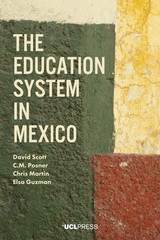
Education System in Mexico
David Scott
University College London, 2018
Over the past three decades, a significant amount of research has sought to relate educational institutions, policies, practices, and reforms to social structures and agencies. A number of models have been developed that have become the basis for attempting to understand the complex relation between education and society. At the same time, national and international bodies tasked with improving educational performances seem to be writing in a void, in that there is no rigorous theory guiding their work, and their documents exhibit few references to groups, institutions and forces that can impede or promote their programs and projects. As a result, the recommendations these bodies provide to their clients display little to no comprehension of how and under what conditions the recommendations can be put into effect. The Education System in Mexico directly addresses this problem. By combining abstract insights with the practicalities of educational reforms, policies, practices, and their social antecedents, it offers a long overdue reflection of the history, effects and significance of the Mexican educational system, as well as presenting a more cogent understanding of the relationship between educational institutions and social forces in Mexico and around the world.
[more]

Biosocial Worlds
Anthropology of Health Environments Beyond Determinism
Jens Seeberg
University College London, 2020
Biosocial Worlds offers state-of-the-art contributions to anthropological reflections on the porous boundaries between human and nonhuman life—the biosocial worlds. Based on changing understandings of the natural and the social, the book explores what it means to be human in these worlds, even as the division between scientific disciplines has, for more than a century, maintained a separation of the natural and the social. Drawing on examples from Botswana, Denmark, Mexico, the Netherlands, Uganda, the United Kingdom, and the United States, the volume argues against the separation of the biological and the social in the study of human and nonhuman life and seeks to unfold the consequences of their discursive separation with the aim of rethinking “the biosocial”.
Health topics in the book include diabetes, trauma, cancer, HIV, tuberculosis, prevention of neonatal disease, and wider issues of epigenetics. In addition, the book addresses constructions of health and disease in a wide range of environments and engages with analyses of the concept of environment. Anthropological reflection and ethnographic case studies, meanwhile, explore how health and environment are entangled in ways that moves their relation beyond interdependence to one of inseparability.
Health topics in the book include diabetes, trauma, cancer, HIV, tuberculosis, prevention of neonatal disease, and wider issues of epigenetics. In addition, the book addresses constructions of health and disease in a wide range of environments and engages with analyses of the concept of environment. Anthropological reflection and ethnographic case studies, meanwhile, explore how health and environment are entangled in ways that moves their relation beyond interdependence to one of inseparability.
[more]
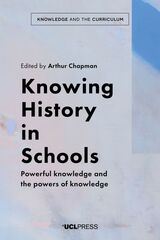
What Should Schools Teach?
Disciplines, Subjects and the Pursuit of Truth
Alka Sehgal Cuthbert
University College London, 2021
A robust rationale on what schools should teach and how.
The design of school curricula involves deep thought about the nature of knowledge and its value to learners and society. Such a serious responsibility raises a number of questions: What is knowledge for? What knowledge is important for children to learn? How do we decide what knowledge matters in each school subject? The blurring of distinctions between pedagogy and curriculum, as well as that between experience and knowledge, has resulted in a confusing message for teachers about the part that each plays in the education of children. This book aims to dispel confusion through a robust rationale for what schools should teach, offering key understanding to teachers of the relationship between knowledge and their own pedagogy. This second edition includes new chapters on chemistry, drama, music, and religious education, as well as an updated chapter on biology. A revised introduction reflects on the emerging discourse around decolonizing the curriculum and on the relationship between the knowledge that children encounter at school and in their homes.
The design of school curricula involves deep thought about the nature of knowledge and its value to learners and society. Such a serious responsibility raises a number of questions: What is knowledge for? What knowledge is important for children to learn? How do we decide what knowledge matters in each school subject? The blurring of distinctions between pedagogy and curriculum, as well as that between experience and knowledge, has resulted in a confusing message for teachers about the part that each plays in the education of children. This book aims to dispel confusion through a robust rationale for what schools should teach, offering key understanding to teachers of the relationship between knowledge and their own pedagogy. This second edition includes new chapters on chemistry, drama, music, and religious education, as well as an updated chapter on biology. A revised introduction reflects on the emerging discourse around decolonizing the curriculum and on the relationship between the knowledge that children encounter at school and in their homes.
[more]
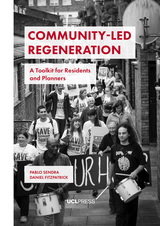
Community-Led Regeneration
A Toolkit for Residents and Planners
Pablo Sendra
University College London, 2020
community-led plans, Community-Led Regeneration offers a toolkit of planning mechanisms and other strategies that residents and planners working with communities can use to resist demolition and propose community-led schemes. The case studies represent a broad overview of groups that formed as a reaction to proposed demolitions of residents' housing, and groups that formed as a way to manage residents' homes and public space better. Drawing from the case studies, the toolkit includes the use of formal planning instruments, as well as other strategies such as sustained campaigning and activism, forms of citizen-led design, and alternative proposals for the management and ownership of housing by communities themselves. Community-Led Regeneration targets a diverse audience: from planning professionals and scholars working with communities, to housing activists and residents resisting the demolition of their neighborhoods and proposing their own plans.
[more]

‘Am I Less British?’
Racism, Belonging, and the Children of Refugees and Immigrants in North London
Dogus Simsek
University College London, 2024
An insightful study into contemporary identity formation and the sense of belonging of children of immigrants from Turkey, through an ethnography of their lives in North London.
‘Am I Less British?’ focuses on the children of refugees and immigrants from Turkey in North London. Providing a rich ethnography of the lives of the children, the book studies their sense of identity and belonging, and their transnational experiences. It aims to understand how the children position themselves within a range of locations (London, North London, and Turkey), where they face class hierarchy, racism, and discrimination. Dogus Simsek explores how these children think about their sense of belonging within the contemporary political context in Britain and Turkey. De-identifying themselves from national identities and holding onto their oppressed identities appear as new forms of resistance in response to racism and exclusion.
The experiences of the young people reflect the complexity of their lives in changing political and social circumstances across the borders of nation-states, as well as the importance of other categories of identity, including local identities. Overall, the book argues that the intersections of local, national, and transnational approaches, the political context through which the lives of young people are framed, and their sophisticated engagement with ideas of race, class, ethnicity, and gender, are crucial to understanding their identity formation.
‘Am I Less British?’ focuses on the children of refugees and immigrants from Turkey in North London. Providing a rich ethnography of the lives of the children, the book studies their sense of identity and belonging, and their transnational experiences. It aims to understand how the children position themselves within a range of locations (London, North London, and Turkey), where they face class hierarchy, racism, and discrimination. Dogus Simsek explores how these children think about their sense of belonging within the contemporary political context in Britain and Turkey. De-identifying themselves from national identities and holding onto their oppressed identities appear as new forms of resistance in response to racism and exclusion.
The experiences of the young people reflect the complexity of their lives in changing political and social circumstances across the borders of nation-states, as well as the importance of other categories of identity, including local identities. Overall, the book argues that the intersections of local, national, and transnational approaches, the political context through which the lives of young people are framed, and their sophisticated engagement with ideas of race, class, ethnicity, and gender, are crucial to understanding their identity formation.
[more]
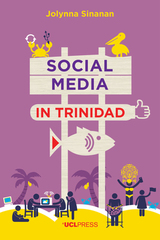
Social Media in Trinidad
Values and Visibility
Jolynna Sinanan
University College London, 2017
Drawing on fifteen months of ethnographic research in one of the most under-developed towns on the Caribbean island of Trinidad, this book describes the uses and consequences of social media for the town’s residents. Jolynna Sinanan argues that this semi-urban region is a place in between: somewhere city dwellers look down on but that other villagers look up to. The town’s chief core value asserts that one should not elevate oneself over others, and Sinanan explores how residents carefully navigate social media as a tool for visibility while still advocating against more cosmopolitan values.
[more]
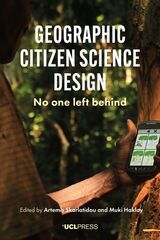
Geographic Citizen Science Design
No One Left Behind
Artemis Skarlatidou
University College London, 2020
A selection of case studies in the field of geographic citizen science casting insight on future research.
Unbeknownst to them as they made their scientific discoveries, Isaac Newton, Charles Darwin, and other “gentlemen scientists” would later inspire a field of scientific practice and innovation known as citizen science. Today, the growth and availability of citizen science projects have been substantial, as anyone can now contribute to a scientific discipline without professional qualifications. As a subset of this movement, geographic citizen science presents a unique approach towards supporting the participation of everyday citizens in the collection, analysis, and dissemination of scientific data. This book presents a selection of wide-ranging case studies that provide insights into the design, interaction barriers, and lessons learned from a diverse set of participants. The volume captures the current status of research and development of geographic citizen science, providing critical insight to inform technological innovation and future research in this area.
Unbeknownst to them as they made their scientific discoveries, Isaac Newton, Charles Darwin, and other “gentlemen scientists” would later inspire a field of scientific practice and innovation known as citizen science. Today, the growth and availability of citizen science projects have been substantial, as anyone can now contribute to a scientific discipline without professional qualifications. As a subset of this movement, geographic citizen science presents a unique approach towards supporting the participation of everyday citizens in the collection, analysis, and dissemination of scientific data. This book presents a selection of wide-ranging case studies that provide insights into the design, interaction barriers, and lessons learned from a diverse set of participants. The volume captures the current status of research and development of geographic citizen science, providing critical insight to inform technological innovation and future research in this area.
[more]
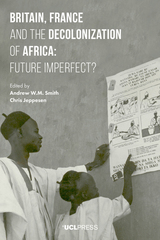
Britain, France and the Decolonization of Africa
Future Imperfect?
Andrew W.M. Smith
University College London, 2017
Looking at decolonization in the conditional tense, this volume teases out the complex and uncertain ends of British and French empire in Africa during the period of ‘late colonial shift’ after 1945. Rather than view decolonization as an inevitable process, the contributors together explore the crucial historical moments in which change was negotiated, compromises were made, and debates were staged. Three core themes guide the analysis: development, contingency and entanglement. The chapters consider the ways in which decolonization was governed and moderated by concerns about development and profit. A complementary focus on contingency allows deeper consideration of how colonial powers planned for ‘colonial futures’, and how divergent voices greeted the end of empire. Thinking about entanglements likewise stresses both the connections that existed between the British and French empires in Africa, and those that endured beyond the formal transfer of power.
[more]
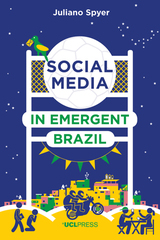
Social Media in Emergent Brazil
How the Internet Affects Social Mobility
Juliano Spyer
University College London, 2017
Since the birth of the internet, low-income Brazilians have received little government support to help them access it. In response, they have largely self-financed their digital migration, which can be seen in the rise of internet cafés in working-class neighborhoods and families purchasing their own computers through special agreements. Juliano Spyer argues that social media is the way for low-income Brazilians to stay connected, despite systematic ridicule from the more affluent, thus suggesting that social media serves a crucial function in strengthening traditional social relations.
[more]
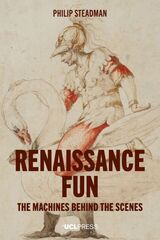
Renaissance Fun
The Machines behind the Scenes
Philip Steadman
University College London, 2021
An amusing account of the technology of Renaissance entertainment and the ancient influences that inspired it.
Renaissance Fun is about the technology of entertainment in the forms of stage machinery, theatrical special effects, gardens, fountains, automata, and self-playing musical instruments from the Renaissance. How did the machines behind these shows work? How exactly were chariots filled with singers let down onto the stage? How were flaming dragons made to fly across the sky? How were seas created on stage? How did mechanical birds imitate real birdsong? What was “artificial music,” three centuries before Edison and the phonograph? How could pipe organs be driven and made to play themselves by waterpower alone? And who were the architects, engineers, and craftsmen who created these wonders? While this book is offered as entertainment in itself, it also offers a more serious scholarly argument centered on the enormous influence of Vitruvius and Hero, two ancient writers who composed on the subject.
Renaissance Fun is about the technology of entertainment in the forms of stage machinery, theatrical special effects, gardens, fountains, automata, and self-playing musical instruments from the Renaissance. How did the machines behind these shows work? How exactly were chariots filled with singers let down onto the stage? How were flaming dragons made to fly across the sky? How were seas created on stage? How did mechanical birds imitate real birdsong? What was “artificial music,” three centuries before Edison and the phonograph? How could pipe organs be driven and made to play themselves by waterpower alone? And who were the architects, engineers, and craftsmen who created these wonders? While this book is offered as entertainment in itself, it also offers a more serious scholarly argument centered on the enormous influence of Vitruvius and Hero, two ancient writers who composed on the subject.
[more]
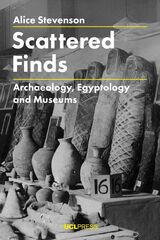
Scattered Finds
Archaeology, Egyptology and Museums
Alice Stevenson
University College London, 2018
Between the 1880s and 1980s, British excavations at locations across Egypt resulted in the discovery of hundreds of thousands of ancient objects that were subsequently sent to some 350 institutions worldwide. These finds included unique discoveries at iconic sites such as the tombs of ancient Egypt’s first rulers at Abydos, Akhenaten, and Nefertiti’s city of Tell el-Amarna and rich Roman Era burials in the Fayum. This book explores the politics, personalities, and social histories that linked fieldwork in Egypt with the varied organizations around the world that received finds. Case studies range from Victorian municipal museums and women’s suffrage campaigns in the United Kingdom to the development of some of the United States’s largest institutions, and from university museums in Japan to new institutions in post-independence Ghana. By juxtaposing a diversity of sites for the reception of Egyptian cultural heritage over the period of a century, this book presents new ideas about the development of archaeology, museums and the construction of Egyptian heritage. It also addresses the legacy of these practices, raises questions about the nature of the authority over such heritage today and argues for a stronger ethical commitment to its stewardship.
[more]

Global Goods and the Country House
Comparative Perspectives, 1650–1800
Jon Stobart
University College London, 2023
Fresh insights into the multi-directional flow of goods and cultures that enmeshed the eighteenth century.
Global goods were central to the material culture of eighteenth-century country houses. Across Europe, mahogany furniture, Chinese wallpapers, and Indian textiles formed the backdrop to genteel practices of drinking sweetened coffee, tea, and chocolate from Chinese porcelain. They tied these houses and their wealthy owners into global systems of supply and the processes of colonialism and empire.
Global Goods and the Country House builds on these narratives and then challenges them by decentering our perspective. It offers a comparative framework that explores the definition, ownership, and meaning of global goods outside the usual context of European imperial powers. What were global goods and what did they do for and mean to wealthy landowners in places at the “periphery” of Europe (Sweden and Wallachia), in the British colonies of North America and the Caribbean, or in the extra-colonial context (Japan or Rajasthan)? By placing these goods in their specific material context—from the English country house to the princely palaces of Rajasthan—we gain a better understanding of their use and meaning and of their role in linking the global and the local.
Global goods were central to the material culture of eighteenth-century country houses. Across Europe, mahogany furniture, Chinese wallpapers, and Indian textiles formed the backdrop to genteel practices of drinking sweetened coffee, tea, and chocolate from Chinese porcelain. They tied these houses and their wealthy owners into global systems of supply and the processes of colonialism and empire.
Global Goods and the Country House builds on these narratives and then challenges them by decentering our perspective. It offers a comparative framework that explores the definition, ownership, and meaning of global goods outside the usual context of European imperial powers. What were global goods and what did they do for and mean to wealthy landowners in places at the “periphery” of Europe (Sweden and Wallachia), in the British colonies of North America and the Caribbean, or in the extra-colonial context (Japan or Rajasthan)? By placing these goods in their specific material context—from the English country house to the princely palaces of Rajasthan—we gain a better understanding of their use and meaning and of their role in linking the global and the local.
[more]
READERS
Browse our collection.
PUBLISHERS
See BiblioVault's publisher services.
STUDENT SERVICES
Files for college accessibility offices.
UChicago Accessibility Resources
home | accessibility | search | about | contact us
BiblioVault ® 2001 - 2024
The University of Chicago Press









